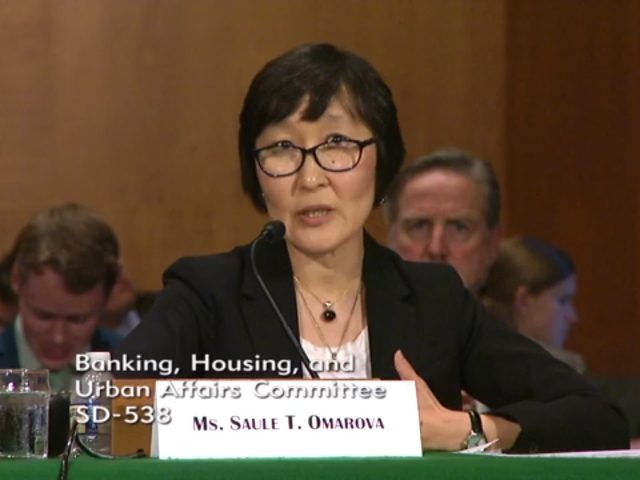Saule Omarova does not want to reform banking regulations—she wants to kill banks.
The biggest Wall Street banks would likely survive her favored reform. But it would have a 100 percent lethality rate for community banks.
Last month, President Joe Biden tapped Cornell Law School Professor Saule Omarova to be the next Comptroller of the Currency. That would put her in charge of the Office of the Comptroller of the Currency (OCC), the Treasury agency that supervises national banks and federal thrifts.
Senator Pat Toomey (R-PA) has asked her to give the Senate Banking Committee a university thesis on Marxism she wrote during her time at Moscow State University in 1989 titled “Karl Marx’s Economic Analysis and the Theory of Revolution in The Capital.” The college reportedly claims it has been destroyed and no copies of it exist.
Fortunately, senators do not need her thirty year old thesis on Marx to determine that Omaraova is too radical for the post. All the evidence they need is in an article published in the October 2021 issue of the Vanderbilt Law Review. In “The People’s Ledger: How to Democratize Money and Finance the Economy,” Omaraova argues that all bank deposits should be transferred into what she calls FedAccounts at the Federal Reserve.
“In principle, FedAccounts can be made available as an alternative to bank deposit accounts, upon a person’s request. As explained below, however, the more effective option would be to transition all deposits to the Fed,” Omarova writes.
This would mean the end of community banking because community banks fund most of their assets with deposits. A recent survey by the Federal Deposit Insurance Corporation found that 84 percent of community bank assets were funded with deposits. Take away those deposits and you are effectively outlawing community banks.
Basically, President Biden has nominated Mr. Potter from “It’s a Wonderful Life” to be one of America’s most important bank regulators. Her plan would shut down George Bailey’s Building & Loan.
That would be a huge blow to rural communities, where community banks account the majority of banking offices and nearly half of all bank deposits. Community banks also play a large role in smaller cities and the American midwest.
Community banks are important to small businesses, farmers, and deposits with low to moderate wealth because they specialize in “relationship banking.”
Despite holding only 15 percent of total industry loans in 2019, community banks funded roughly 31 percent of farm sector debt in 2019, with half of that total financed by community-bank agricultural specialists, according to the FDIC. They held 36 percent of the banking industry’s small business loans in 2019, the FDIC found. Thirty percent of CRE loans, mortgages on commercial property, are held by community banks, FDIC data show.
“Community banks focus on building relationships with small business owners and tend to make loans that require more interaction with the borrower. By contrast, noncommunity banks, which dominate the smallest category of business loan originations—loans below $100,000 that are typically business credit card lines—tend to use a scoring model that requires little interaction with customer,” the FDIC said.
Omarova, who was born and raised in Soviet Kazakhstan, realizes that there is likely to be political opposition to ending community banking. To distract from the destructiveness of her plan, she offers to let community banks operate as “the Fed’s representative office.” Their job would be to run ATMs and “help the Fed with day to day administration of FedAccounts.” That is, they would become a part of a centralized credit bureaucracy instead of independent banking businesses in competition for customer deposits and banking business.
The Montana Independent Bankers group has written to Sens. Jon Tester (D-MT) and Steve Daines (R-MT) opposing Omarova’s confirmation and calling on the senators to vote against her.
“Ms. Omarova’s positions are antithetical to the economic principles that have long-guided this nation’s monetary policies and systems,” MIB president Andrew West wrote.
Sen. Toomey, the ranking member of the Senate Banking Committee, described her as a most radical nominee to a post in the federal government that he has ever seen.
“There’s a lot that’s extraordinary and radical here—but maybe the heart of it is that Ms. Omarova doesn’t just want tightened regulation of banks. What she wants to, and I quote—this is her words—‘effectively end banking as we know it.’ Those are words she wrote just last year,” Toomey said in a speech on the Senate floor.
The largest U.S. banks are far less dependent on deposit funding than community banks. They can fund themselves on the global bond market and far fewer of their most profitable lines of business are connected to taking deposits from customers. Investment banking and private equity investing do not need depositors at all. Omaraova’s plans would disrupt and transform larger banks but not necessarily kill them.
Omarova’s ideas are far from the mainstream. In a recent speech, Federal Reserve Governor Michelle Bowman, the former Kansas banking commissioner, pointed out how important community banks are.
“By serving communities, households, and businesses that may be underserved by larger institutions, community banks play a key role in advancing diversification in the U.S. banking system. First and foremost, community banks provide critical financial services to their communities and to many customers who might have limited geographic access to banking services,” Bowman said.
Bowman advocated for policies to encourage new bank formation, a view well within the mainstream and absolutely the opposite of Omarova’s community bank-killer proposal.

COMMENTS
Please let us know if you're having issues with commenting.